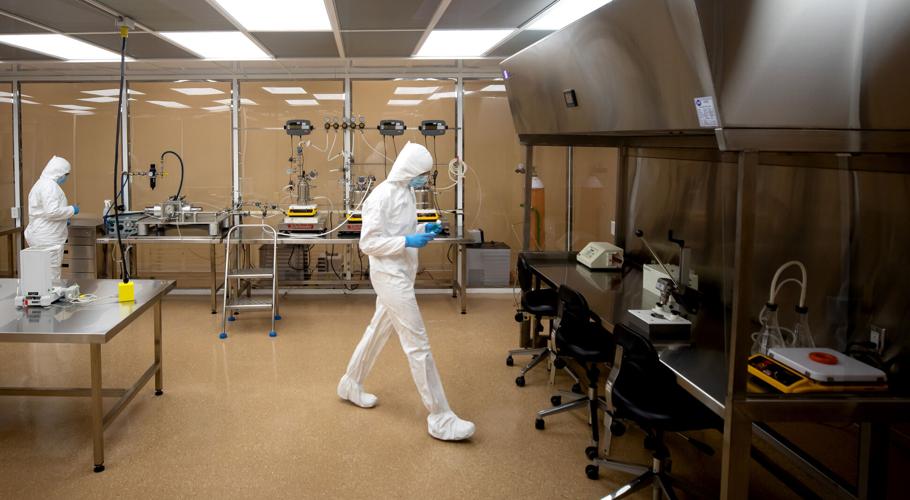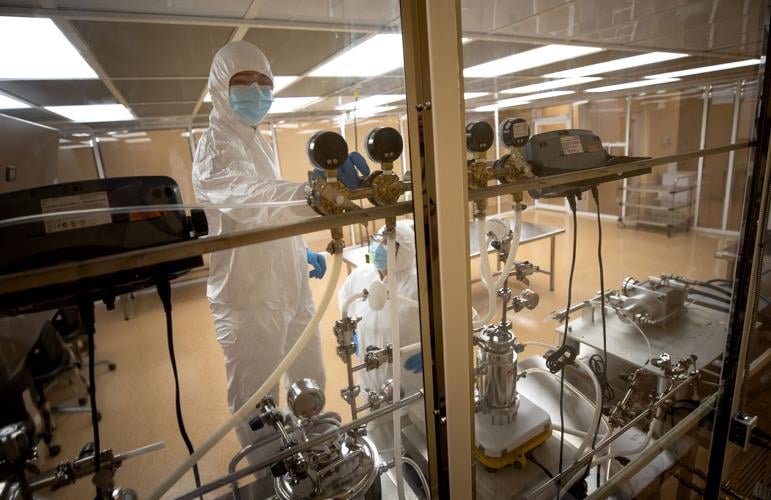A tandem of homegrown Tucson drug-development companies plans to make its own drugs for testing at a new manufacturing plant — and eventually start producing their drugs here for worldwide distribution.
NuvOx Pharma, a drug startup founded by former University of Arizona radiologist Dr. Evan Unger, recently moved into an 1,800-square-foot addition to its longtime offices near downtown at 1635 E. 18th St.
Unger said the company’s new manufacturing space, which includes a 900-square-foot clean room, is the only facility of its kind in Southern Arizona.
The clean room will make drugs for NuvOx, which is in mid-stage clinical trials with its drug candidate to treat brain tumors and strokes, as well as manufacture for Microvascular Therapeutics, a company formed in 2009 by Unger and his son, UA faculty radiologist Dr. Wyatt Unger.
The drug manufacturing labs will initially make the companies’ injectable drugs for trials, but the plan is to produce the drugs in-house once they win federal regulatory approval.
“The goal is actually to commercially make two different products in this facility,” Evan Unger said. “It’s a big undertaking, but that’s what we’re trying to do.”
The facility still must undergo rigorous inspections and approvals from the U.S. Food and Drug Administration, Unger said, noting that the modular clean room that the company purchased as part of the expansion was previously used to make approved drugs.
Founded in 2008, NuvOx is focused on therapeutic delivery of oxygen based on patented technology for gas “microbubbles” originally developed as an ultrasound imaging contrast agent.
The company, which employs 11 people, has completed Phase Ib/II clinical trials for use of its flagship drug to treat brain cancer, with a drug that can deliver oxygen to tumors to make them more vulnerable to radiation treatment, as well as a Phase Ib/II trial for a related drug to treat ischemic stroke.
Evan Unger said the company is working to get its drug into the next phase of trials for both indications, which would involve more patients and take several years to complete.
But the COVID-19 pandemic has delayed some of its clinical trials and made it more difficult to raise the millions of dollars needed to fund the next trials, said Unger, who has stepped down from his professorial duties at the UA but remains a member of the UA Cancer Center.
Unger said the pandemic has held up a $3 million National Cancer Institute grant NuvOx won to study its drug for treatment of glioblastoma multiforme, an aggressive form of brain cancer.
In 2019, NuvOx’s stroke trial demonstrated safety of the drug candidate and marked improvement in patients’ ability to live independently after 30 and 90 days.
“Our data is really compelling in stroke,” Evan Unger said.
NuvOx also is conducting preclinical studies using its drugs to treat traumatic brain injury, heart attack, shock induced by heavy bleeding and a common complication of sickle cell disease.
The COVID-19 pandemic also has made fundraising more difficult for the privately held company, Unger said.
The company is now looking to raise a bridge round of $3 million and will need $15 million to $20 million to finish the next rounds of clinical trials, he said.
“I think in order to ink the deal, you have to meet in person, and just now it’s opening up,” said Evan Unger, who has often crisscrossed the country for investor presentations.
Microvascular Therapeutics, with Wyatt Unger as chief medical officer, is working to develop an improved version of Definity, an ultrasound contrast agent the elder Unger developed in the 1990s and sold to chemicals giant DuPont in 1999 for about $40 million.
Definity, launched in 2001 and approved for ultrasound imaging of the heart, has since changed hands but is still the most prescribed drug of its kind in the U.S.
In 2018, Microvascular Therapeutics won a $1.7 million grant from the National Institutes of Health to develop its initial drug, called MVT-100.
The company is conducting a Phase I clinical trial to gauge the new contrast agent’s safety and effectiveness when used for echocardiograms — ultrasound imaging of the heart — compared with Definity.
Microvascular Therapeutics is also studying the use of its improved microbubbles to deliver therapies for heart attack, Alzheimer’s disease, pancreatic and breast cancers, and inflammation of the eye.
Last year, the company won Small Business Innovation Research grants from the National Institutes of Health to study its drug candidates for treatment of heart attack and Alzheimer’s.





